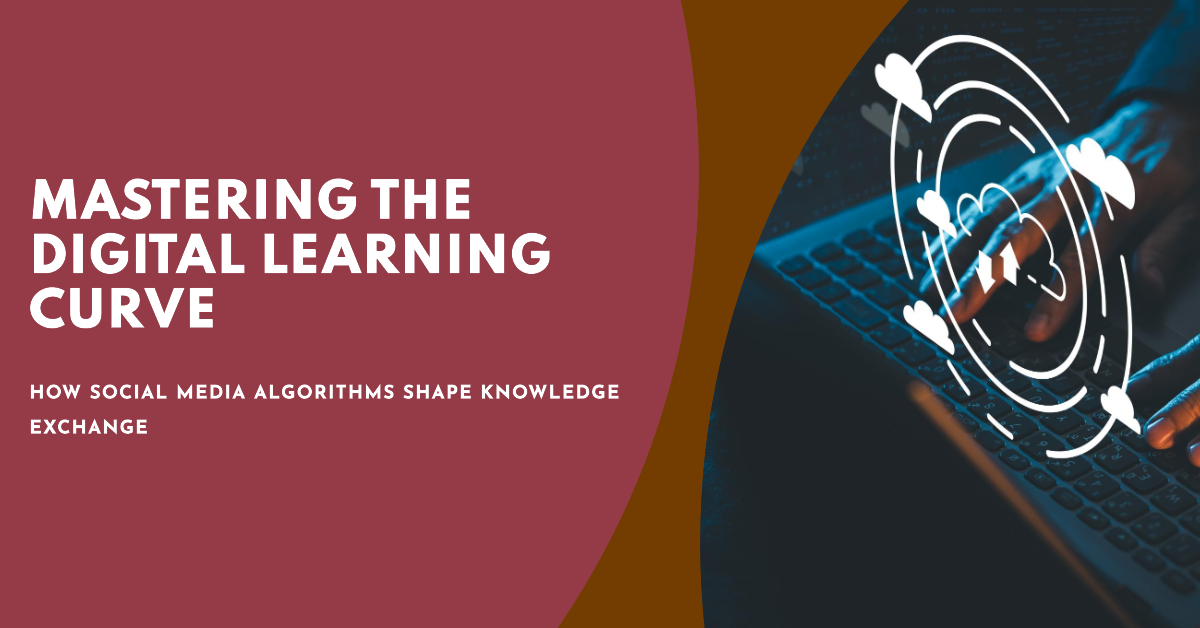Navigating the Digital Learning Curve: How Social Media Algorithms Shape Knowledge Exchange
In the digital age, social media algorithms are reshaping how we exchange knowledge and learn from one another. This blog explores the profound impact of these algorithms on our learning experiences and provides insights into how we can navigate this evolving landscape.

In today's interconnected world, the way we learn and exchange knowledge has undergone a profound transformation, largely due to the omnipresence of social media. From Facebook to Twitter, Instagram to TikTok, these platforms have become integral to our daily lives, influencing how we consume and share information. But what lies beneath the surface of these platforms is equally important: social media algorithms, the invisible hands guiding our online interactions. In this blog, we will delve into how these algorithms shape knowledge exchange in the digital age and offer strategies to effectively navigate this dynamic learning curve.
The Power of Social Media Algorithms
Social media algorithms are complex sets of rules and calculations that determine what content users see on their feeds. These algorithms take into account various factors, including user behavior, engagement, and content relevance, to curate a personalized experience for each user. While they may seem like mere mathematical equations, these algorithms wield significant influence over our online interactions and learning processes.
Tailoring Content for You
One of the most remarkable aspects of social media algorithms is their ability to tailor content to individual users. By analyzing your past interactions, the algorithm predicts what type of content you are likely to engage with, be it news articles, videos, or images. This personalization has its advantages, such as exposing you to content that aligns with your interests and preferences, ultimately making your online experience more engaging and relevant.
However, this tailoring can also lead to a filter bubble, where users are exposed only to content that confirms their existing beliefs and preferences. This can limit the diversity of information and perspectives encountered, potentially hindering a well-rounded learning experience.
The Echo Chamber Effect
The echo chamber effect is a consequence of social media algorithms that prioritize content similar to what you've previously engaged with. While this can enhance user engagement, it can also reinforce preexisting biases and limit exposure to differing viewpoints. For instance, if you follow individuals who share your political beliefs, you may find your feed inundated with content that confirms those beliefs, leaving little room for constructive debate and learning from alternative perspectives.
To navigate this challenge, it's crucial to consciously seek out diverse voices and viewpoints online. Consider following accounts or joining groups that provide a balanced spectrum of opinions, allowing for a more comprehensive understanding of complex issues.
The Virality Factor
Social media algorithms also play a significant role in determining what content goes viral. Posts that garner high levels of engagement—likes, shares, comments—are more likely to be promoted by the algorithm and reach a broader audience. This virality factor can have a profound impact on what knowledge is disseminated widely and what remains hidden in the depths of the internet.
As users, we can contribute to this process by actively engaging with and sharing content that we find valuable and informative. By doing so, we play a role in shaping the knowledge landscape on social media.
Algorithmic Serendipity
While algorithms are often criticized for creating filter bubbles, they can also introduce users to unexpected and serendipitous discoveries. Social media algorithms are designed to surface content that might pique your interest based on your previous interactions, even if it falls slightly outside your usual preferences.
To make the most of this serendipity, embrace the occasional detour from your routine. Explore content outside your comfort zone, engage with new voices, and let the algorithm surprise you with unexpected gems of knowledge.
Mitigating Algorithmic Bias
Social media algorithms are not immune to biases, which can impact what content is promoted and suppressed. Sometimes, these biases can stem from things like a person's race, gender, or economic situation. To foster a fair and inclusive digital learning environment, it's essential to be aware of these biases and advocate for algorithmic transparency and fairness.
Additionally, be mindful of the content you engage with, as your interactions can inadvertently amplify algorithmic bias. Support content that promotes diversity and inclusivity and report harmful or discriminatory content when you encounter it.
Balancing Screen Time
As we immerse ourselves in the digital learning landscape shaped by social media algorithms, it's crucial to strike a balance. Spending excessive time scrolling through social media feeds can lead to information overload and digital fatigue. To maintain a healthy relationship with online learning, set boundaries for screen time, and allocate dedicated periods for focused, offline learning.
Conclusion
In conclusion, social media algorithms have transformed the way we exchange knowledge and learn from one another. While they offer personalized and engaging experiences, they also present challenges related to filter bubbles, echo chambers, and biases. Navigating this digital learning curve effectively requires conscious effort, such as seeking diverse perspectives, actively engaging with valuable content, and advocating for algorithmic fairness.
As we continue to navigate this evolving landscape, let us harness the power of social media algorithms to expand our horizons, foster meaningful connections, and facilitate the exchange of knowledge that enriches our lives. Embrace the algorithmic age of learning, but do so with critical thinking and a commitment to open-minded exploration.










